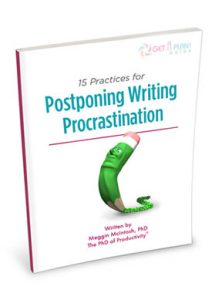When You Need to Show Up, Shut the Door, and Get Your Writing Done! by Beverly Delidow
 “Well, shoot! I know it was just here… Where did I leave my inspiration…?”
“Well, shoot! I know it was just here… Where did I leave my inspiration…?”
Ever had that thought? I have – usually about fifteen minutes into a writing session during which I’ve gotten up to microwave my coffee twice, been to the rest room once, and stopped to contemplate my shopping list. (Well, I was WRITING it!) And written exactly four words.
Lean in, kids – I’ve got a secret. It’s not really inspiration you need. It’s Momentum. And, oh yes, it can be hard to find, keep, and nurture. Here are a few ways I’ve found to keep myself on track with a writing assignment and get it DONE. Even if the heavens don’t open up and write “YOUR WORDS HERE” with a giant bolt of lightning.
[A quick disclaimer: Most of these tips are points made at various times by lots of wonderful coaches, especially including Meggin (check out her 30 Articles Workshop!). But sometimes it helps to hear things in a different voice – and I got an “A” in “Different” – so here goes.]
- Make it an appointment – in the planner, in cement. Really. Put your writing time in your calendar, whatever you use, and make it a standing appointment. If you use an electronic planner that broadcasts your busy times to others on your network, so much the better. Yes, you are busy during that time, and, no, that appointment with yourself cannot be re-scheduled to a time more convenient for someone else. This is YOURS.
- Show up. Need I say more? You made this appointment, now keep it. Go to your writing spot at the scheduled time, have everything ready, and start writing. Yep. Just like that.
- Shut the door. Or do whatever you need to do to cut off interruptions. Put a sign out that tells people when they can expect to reach you, but keep your writing time an open productive space for your mind. Which leads me to the next point…
- Turn off electronic distractions. Since most of us write on a computer screen, this means closing your email, putting the phone on cover if you need to, and leaving your handheld doohickeys (I know you know what I mean, smartphone fondler over there) out of reach. You may leave your browser open if you are using it as a timer (http://www.online-stopwatch.com) or as a hilarious motivator (http://writeordie.drwicked.com/), but random surfing is out.
- Refuse interruption. If, in spite of your best effort, someone does interrupt you for a reason that does not involve flames, flood, or disaster, tell them you are working and that you will be able to assist them at some specific later time. And then close your door again. You have work to do and doing it is your priority.
- List – BUT DO NOT WORK ON – extraneous tasks that occur to you while writing. When I am writing it is not unusual for my brain to skitter sideways into (barely) (tangentially) related matters: “… the side of the ship…” Oh, yeah – my brother’s birthday is coming up … I sent him a book about SHIPS last year… I wonder what I should send him this year… last year I had to SHIP it overnight…he really liked it, though… so did…” Right. If I don’t nip that in the bud, in two seconds flat I will be surfing the ‘net for the perfect sisterly gift and completely forget what I was writing. Better plan: I keep a small notepad next to my workspace. When a stray thought wanders through, I corral it by writing it down, and go back to my work. Getting it onto the notepad captures that thought, and then it doesn’t keep tromping through the space I’m trying to use for productive writing.
- Avoid editing or censoring yourself. You’ve heard this before, from multiple sources, but it bears repeating. When you’re trying to write and having trouble gaining momentum, it’s time to turn off the editor and let ‘er rip. If you have to, you can even turn off those little squiggly reminders from your word processor so you won’t see them and start fussing. Editing can happen later, but you can’t edit what hasn’t been created. Step out of your own way and let it be as rough and “ridiculous” as it wants to be. Get it down; when you are ready to edit your draft, then you can sculpt it into the finished product.
- At the end of your appointed time STOP. I know, I know – you’re all staring at the page, thinking “WHAT?! I just got going and you’re telling me to STOP?! You’re nuts!” Point taken. I mean it, though. You scheduled a certain amount of time for this activity. If you’re really getting good work done, OK, finish that paragraph or short section, but don’t stretch it beyond ten or fifteen minutes. One of the reasons you don’t want to stop is that you’re afraid of losing momentum. That’s why the next tip ensures you’ll be able to pick up again.
- Make note where to start again. Right on the page where you stopped, write your plan for what to do next. Just a few words or phrases that remind you how you intend to carry the work forward. When you start the next session, turn to that note and take off from there. It works. And you’ll get out of the habit of needing a huge push to start writing again.
-
Be accountable. Oh yeah. Find a buddy, a group, or a coach that will hold your little fingers to the fire. It’s one thing if you told yourself you were going to write the draft of a letter or a section of a manuscript and you didn’t do it. You might let yourself off easy. It’s quite another to tell your writing buddy, “Well, no, I didn’t get to it because I was doing other stuff, y’know, important stuff…” If your buddy is a good coach, that’s not going to cut it. (For all you buddies out there – DON’T BE ‘NICE’! “Double next time and the lattés are on you” sounds like a plan!) Tell someone you’re going to do it – then DO, so you can tell them you DID. And have it done.
When you get it done – Reward yourself. You worked hard, you wrote, you learned, and you’re even better at it for the next time. Celebrate getting it done and getting to move on to the next project.
Well, my work here is done. Lattés, anyone?
© Beverly Delidow | delidow@marshall.edu
Beverly Delidow is a professor, writer, and photographer in West Virginia. She has published articles, fiction, poetry, and photographs in a number of forms.
 To help you be more productive in your writing endeavors you will want the Get a Plan! Guide® to Postponing Writing Procrastination part of the Get a Plan! Guides® series designed to give you the ideas and inspiration to do your work easier, faster, and in a more focused fashion.
To help you be more productive in your writing endeavors you will want the Get a Plan! Guide® to Postponing Writing Procrastination part of the Get a Plan! Guides® series designed to give you the ideas and inspiration to do your work easier, faster, and in a more focused fashion.




